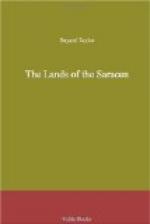We rode down the mountain and continued our journey over the plain of Esdraelon—a picture of summer luxuriance and bloom. The waves of wheat and barley rolled away from our path to the distant olive orchards; here the water gushed from a stone fountain and flowed into a turf-girdled pool, around which the Syrian women were washing their garments; there, a garden of orange, lemon, fig, and pomegranate trees in blossom, was a spring of sweet odors, which overflowed the whole land. We rode into some of these forests, for they were no less, and finally pitched our tent in one of them, belonging to the palace of the former Abdallah Pasha, within a mile of Acre. The old Saracen aqueduct, which still conveys water to the town, overhung our tent. For an hour before reaching our destination, we had seen it on the left, crossing the hollows on light stone arches. In one place I counted fifty-eight, and in another one hundred and three of these arches, some of which were fifty feet high. Our camp was a charming place: a nest of deep herbage, under two enormous fig-trees, and surrounded by a balmy grove of orange and citron. It was doubly beautiful when the long line of the aqueduct was lit up by the moon, and the orange trees became mounds of ambrosial darkness.
In the morning we rode to Acre, the fortifications of which have been restored on the land-side. A ponderous double gateway of stone admitted us into the city, through what was once, apparently, the court-yard of a fortress. The streets of the town are narrow, terribly rough, and very dirty, but the bazaars are extensive and well stocked. The principal mosque, whose heavy dome is visible at some distance from the city, is surrounded with a garden, enclosed by a pillared corridor, paved with marble. All the houses of the city are built in the most massive style, of hard gray limestone or marble, and this circumstance alone prevented their complete destruction during the English bombardment in 1841. The marks of the shells are everywhere seen, and the upper parts of the lofty buildings are completely riddled with cannon-balls, some of which remain embedded in the stone. We made a rapid tour of the town on horseback, followed by the curious glances of the people, who were in doubt whether to consider us Turks or Franks. There were a dozen vessels in the harbor, which is considered the best in Syria.
The baggage-mules had gone on, so we galloped after them along the hard beach, around the head of the bay. It was a brilliant morning; a delicious south-eastern breeze came to us over the flowery plain of Esdraelon; the sea on our right shone blue, and purple, and violet-green, and black, as the shadows or sunshine crossed it, and only the long lines of roaring foam, for ever changing in form, did not vary in hue. A fisherman stood on the beach in a statuesque attitude, his handsome bare legs bathed in the frothy swells, a bag of fish hanging from his shoulder, and




